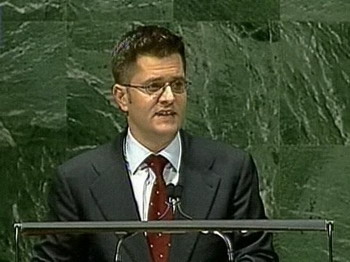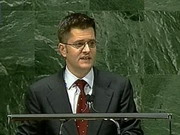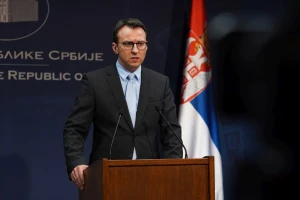- Serbia
Get to know Serbia
- Citizens
Culture and science
Health services
Pension and disability insurance
- Business
Employment
Economy
- Media
- Government
- Contact
Keep in touch
Contact form
Back
Keepin touch
Whether you have a question, comment, suggestion or any problem in the purview of the government, send us your message and we will try to respond as soon as possible. If your problem is not in our purview, we will forward your message to the relevant institution.
Q:
A:
UN General Assembly adopts joint Resolution by Serbia, EU
Belgrade/New York,
10 September 2010
The UN General Assembly adopted by consensus last night a joint Resolution by Serbia and the EU on the advisory opinion by the International Court of Justice (ICJ) on the legality of the unilateral declaration of independence by Kosovo.
Minister of Foreign Affairs Vuk Jeremic presented the Resolution to the General Assembly before the voting, stating that the Resolution is a fundamentally status-neutral document.
The Minister stressed the readiness of the Serbian side for dialogue, but underscored that Belgrade does not and shall not recognise the unilateral declaration of the province’s independence.
Jeremic stated that this document welcomes EU's readiness to facilitate the process of dialogue between the two sides that would contribute to stability and improving the lives of the people in the province.
He added that with the adoption of the Resolution, an atmosphere would be created in which a lasting solution would be able to be found through dialogue between Serbs and Albanians.
Do not doubt that Serbia remains adamant and that we will not tire because we cannot fail. Great challenges are ahead of us, but our strength is great as well, Jeremic maintained.
We look to the future, convinced that our stance is just, he concluded.
The text of the Resolution, which Serbia submitted after several days of diplomatic contacts with the EU, calls for dialogue on the Kosovo issue and does not in any way recognise the independence of the Serbian southern province.
This ended the process that began before the ICJ, but it does not mean that the world organisation will no longer discuss this issue.
The UN Security Council pursuant to Resolution 1244 will continue to engage with this issue.
The text of the Resolution was agreed on with all 27 EU member states – 22 that have recognised Kosovo's independence, and five that did not do so.
Jeremic emphasised after the session in a statement to Tanjug news agency that the adopted Resolution in no way confirms the independence of Kosovo or calls into question the territorial integrity of Serbia.
He pointed out that the adoption of the Serbian Resolution on Kosovo-Metohija that Serbia had harmonised on with the EU, is of great importance, because it ends the process before the ICJ with a political conclusion that calls for negotiation.
Most of the speakers in the debate at the UN General Assembly, including some of the most influential states – Russia, China, India, Brazil, Argentina, Indonesia – advocated in favour of Serbia, Jeremic underlined.
He recalled that two-thirds of UN member states have not recognised the unilaterally proclaimed independence of Kosovo and that a solution acceptable to all parties can be achieved only through dialogue.
Jeremic said that the UN General Assembly session was delayed for more than two hours, as the representatives of Kosovo Albanians appeared in the hall uninvited by any UN member states.
The Minister remarked that Serbian representatives demanded that the Kosovo Albanians leave the room, but they did not do so.
The dispute was resolved by the United States, Germany, Great Britain, Italy and France as in the meanwhile they invited representatives of Kosovo Albanians to attend the meeting as their guest.
The Minister stressed the readiness of the Serbian side for dialogue, but underscored that Belgrade does not and shall not recognise the unilateral declaration of the province’s independence.
Jeremic stated that this document welcomes EU's readiness to facilitate the process of dialogue between the two sides that would contribute to stability and improving the lives of the people in the province.
He added that with the adoption of the Resolution, an atmosphere would be created in which a lasting solution would be able to be found through dialogue between Serbs and Albanians.
Do not doubt that Serbia remains adamant and that we will not tire because we cannot fail. Great challenges are ahead of us, but our strength is great as well, Jeremic maintained.
We look to the future, convinced that our stance is just, he concluded.
The text of the Resolution, which Serbia submitted after several days of diplomatic contacts with the EU, calls for dialogue on the Kosovo issue and does not in any way recognise the independence of the Serbian southern province.
This ended the process that began before the ICJ, but it does not mean that the world organisation will no longer discuss this issue.
The UN Security Council pursuant to Resolution 1244 will continue to engage with this issue.
The text of the Resolution was agreed on with all 27 EU member states – 22 that have recognised Kosovo's independence, and five that did not do so.
Jeremic emphasised after the session in a statement to Tanjug news agency that the adopted Resolution in no way confirms the independence of Kosovo or calls into question the territorial integrity of Serbia.
He pointed out that the adoption of the Serbian Resolution on Kosovo-Metohija that Serbia had harmonised on with the EU, is of great importance, because it ends the process before the ICJ with a political conclusion that calls for negotiation.
Most of the speakers in the debate at the UN General Assembly, including some of the most influential states – Russia, China, India, Brazil, Argentina, Indonesia – advocated in favour of Serbia, Jeremic underlined.
He recalled that two-thirds of UN member states have not recognised the unilaterally proclaimed independence of Kosovo and that a solution acceptable to all parties can be achieved only through dialogue.
Jeremic said that the UN General Assembly session was delayed for more than two hours, as the representatives of Kosovo Albanians appeared in the hall uninvited by any UN member states.
The Minister remarked that Serbian representatives demanded that the Kosovo Albanians leave the room, but they did not do so.
The dispute was resolved by the United States, Germany, Great Britain, Italy and France as in the meanwhile they invited representatives of Kosovo Albanians to attend the meeting as their guest.
-
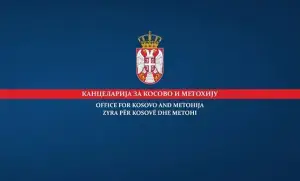 Belgrade, 23 July 2025
Belgrade, 23 July 2025Death of harvesters in Staro Gracko must not be forgotten
-
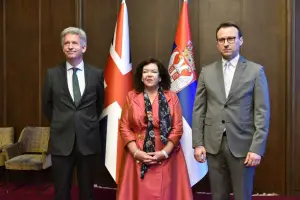 Belgrade, 18 July 2025
Belgrade, 18 July 2025Daily exposure of Serbs in Kosovo and Metohija to Priština’s terror
-
 Belgrade, 11 July 2025
Belgrade, 11 July 2025Aid to families in Kosovo and Metohija who suffered damage from fires
-
 Belgrade, 10 July 2025
Belgrade, 10 July 2025Serbs in Kosovo and Metohija existentially threatened, disenfranchised
-
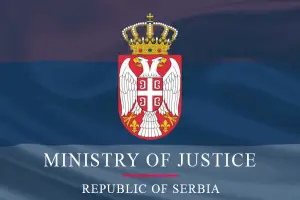 Belgrade, 19 June 2025
Belgrade, 19 June 2025Priština once again gravely violates basic human rights of Serbs in Kosovo and Metohija
-
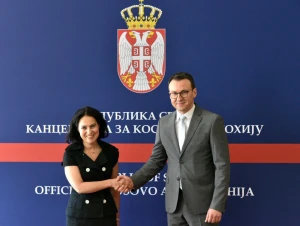 Belgrade, 13 June 2025
Belgrade, 13 June 2025Constant violent acts of Priština against Serbian people in Kosovo and Metohija
-
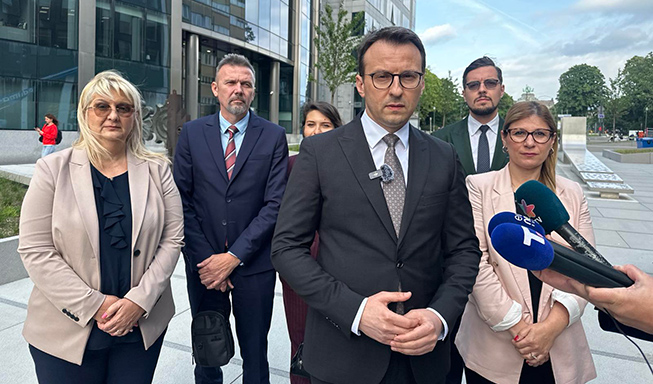 Belgrade/Brussels, 10 June 2025
Belgrade/Brussels, 10 June 2025Formation of Community of Serb Municipalities, de-escalation of situation in north of Kosovo and Metohija a priority
-
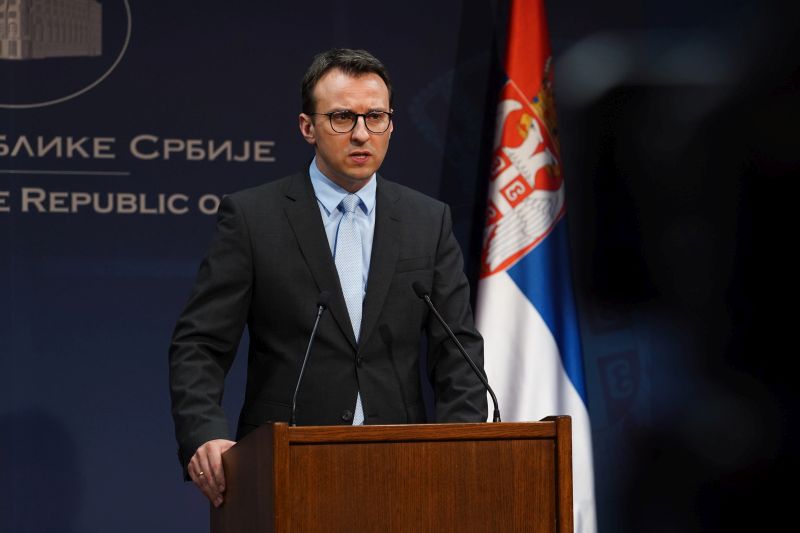 Belgrade, 27 May 2025
Belgrade, 27 May 2025“Kosovo police” raid premises of Leposavić Sports and Tourism Organisation
-
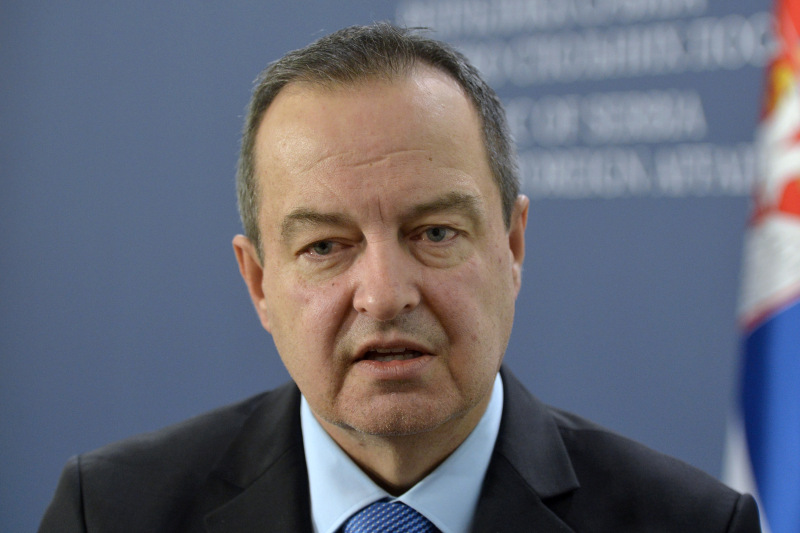 Belgrade, 24 May 2025
Belgrade, 24 May 2025Arrest warrant issued for attacker on Serbian high school graduate in North Mitrovica

